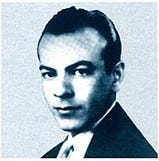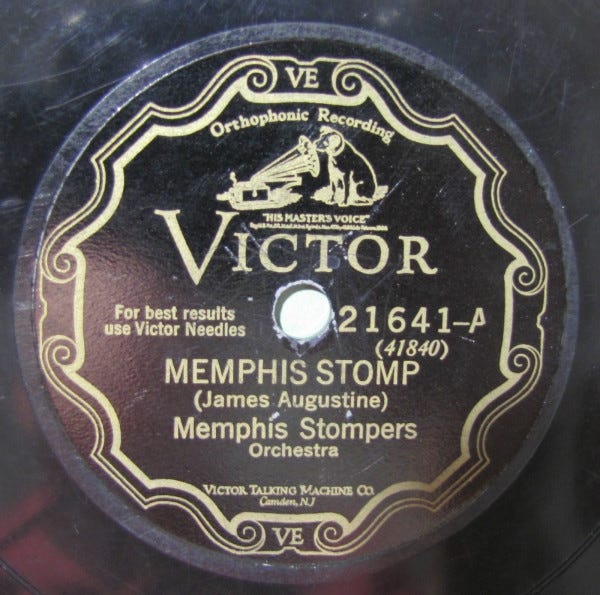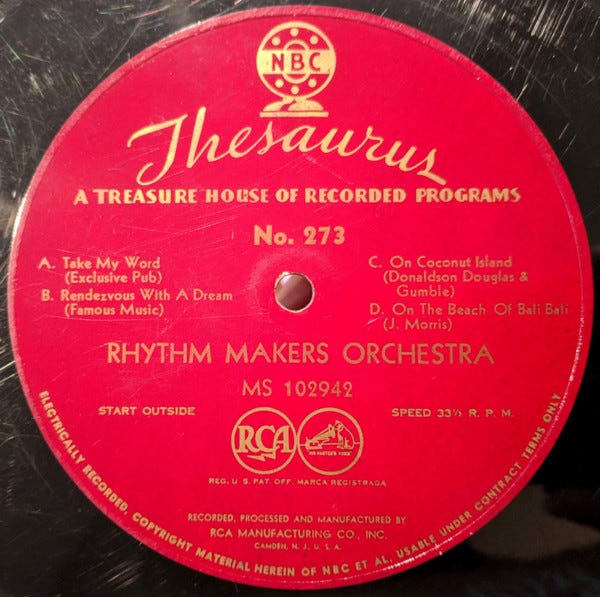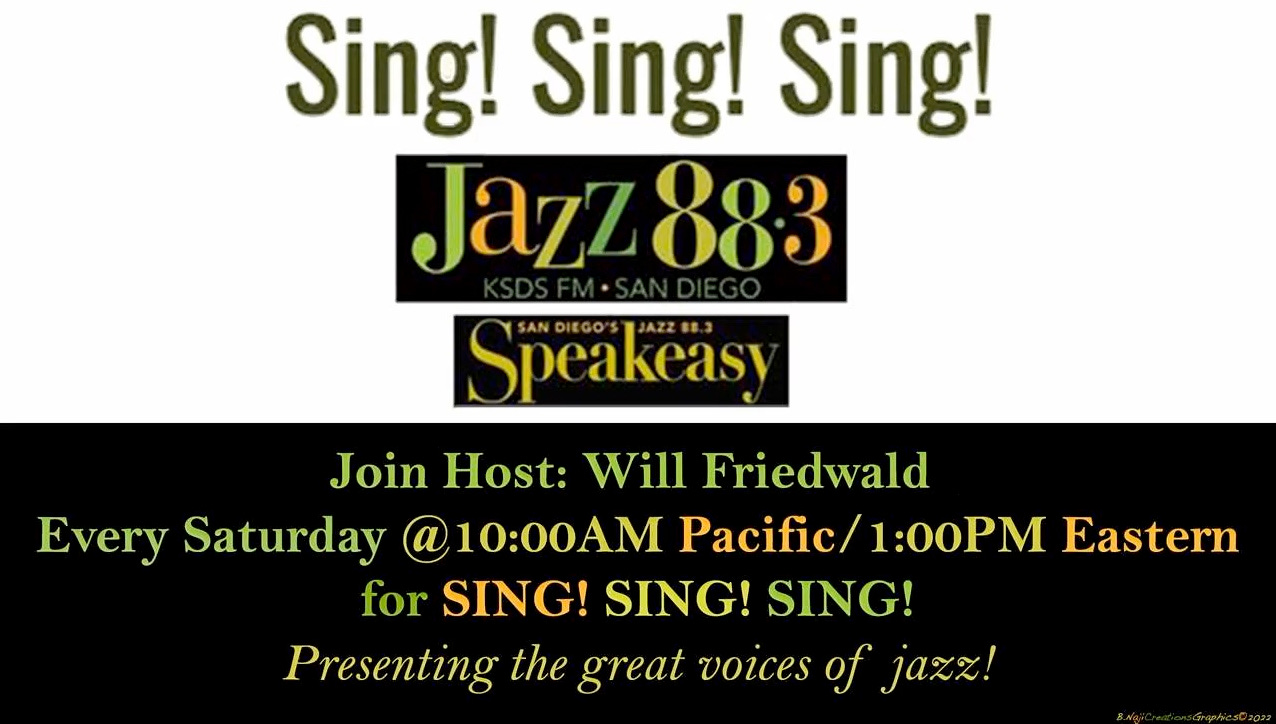(Continued from part 1 - special thanks to Paul Kahn and Catherine Russell for this installment!)
About three minutes in, we hear the third and most central theme. This is “Call of the Freaks,” which by 1932 was already a jazz standard, composed by the Panama-born, New Orleans-raised pianist Luis Russell, later famous for serving as a musical director and famous all over again in the 21st century as the father of the excellent contemporary jazz and blues headliner Catherine Russell.
Luis Russell And His Burning Eight - The Call Of The Freaks
In the jazz parlance of the era, “freaks” was a reference to “freakish” playing, as scholar Andrew Homzy has shown, it meant growling so ferociously on a muted trumpet or playing notes so blue on a funky clarinet that you were leaving conventional pitch behind. The tune is basically a minor key blues, and it proved so popular that Russell was called upon to record it three times in 1929 alone: in January with a smaller group called “Luis Russell and his Burning Eight” for Okeh Records, then in February under King Oliver’s leadership for Victor, and then again in September with his full big band in the most popular platter, released as “New Call of the Freaks.”
Luis Russell - The New Call Of The Freaks
It’s the September version - “The New Call of the Freaks” - that became the template. This is the arrangement that Vince Giordano and the Nighthawks currently perform on many a Monday evening at Birdland. It starts with a tinkling, almost abstractly placid piano introduction (Russell himself), rather light and airy - with nary a hint of the freakishness that is about to follow. Suddenly, a heavy drumbeat comes in and things start getting freaky and funky. This sh*t, as the kids say, is about to get real.
We then hear a wailing clarinet solo (Albert Nicholas), followed by an equally forceful moaning trombone (J. C. Higginbotham), and then a trumpet (Red Allen) - both are unmuted, but incredibly mournful. Next comes a tutti, a statement of a transitional theme by the ensemble, and we hear what passes for the vocal: the entire ensemble chants verbally, “Stick out your can / here comes the garbage man.”
Other solos follow the chant, and the September 1929 Russell recording is also notable for a very rare, very early appearance of the vibraphone, heard in the final chorus (probably played by drummer Paul Barbarin), or as it was sometimes known, the electrified vibraharp.
Red Nichols - 1930 transcription
Most versions follow this trajectory - although some of the later interpretations change around the solo order or add a spoken passage at the start. Red Nichols made what might be the first so-called “cover” version, for a Brunswick radio transcription in 1930; he too opens with the clarinet, but follows with his own distinctive and somewhat less mournful cornet solo; the most imposing soloist here is Adrian Rollini on bass saxophone.
Washboard Rhythm Kings (1931)
The Washboard Rhythm Kings recorded the tune in 1931, and their version opens with the following dramatic scenario:
Sound effect - drum beats simulating someone knocking on the door.
He: “Garbage, lady! Stick out your can, here come the garbage man!”
She: “Man, get away from my door! I ain’t got no garbage!”
Joel Shaw (Gene Kardos) - Call of the Freaks (1932)
The next recording, by Gene Kardos and his Orchestra, recorded in March 1932 and released as by “Joel Shaw and his Orchestra” was cut about a month after Any Rags was released. Kardos reprises the “He / She” dialog at the start, although the “she” is obviously a male musician speaking in a faux-female falsetto reminiscent of a Fleischer cartoon. In 1934 one of the best English groups, Lew Stone And His Monseigneur Band, recorded a convincing version; they don’t include the opening dialog, but like Shaw they start with the trumpet solo, probably played by Nat Gonella. The Kardos version has extra singing; a soloist leads the band in some Cab Calloway-inspired call-and-response; the Stone version has no singing at all; perhaps Londoners at the prestigious Monseigneur Hotel considered it bad form to sing about garbage.
Milton Brown “Garbage Man Blues”
In 1935, the pioneering western swing band, Milton Brown and his Musical Brownies, recorded a treatment that seems to use the Washboard Rhythm Kings and Kardos as a starting point; this one starts with the door knockingand the he / she dialog, but then launches into the vocal, with Brown singing, answered in a call-and-response by the ensemble. The actual “Freaks” theme is not stated, but still this too is clearly Luis Russell’s song. However, they changed the title, to “Garbage Man Blues,” and gave credit to someone else - Dan Parker, who gets credit on a number of Brown recordings. Remarkably, Russell’s publisher, the highly litigious Joe Davis, did not sue. Another jazz-influenced country band, Roy Newman and his Boys, also recorded “Garbage Man Blues,” using the Brown disc as their own starting point.
Still, under the original title, it continued to find favor by groups as disparate as The Harlem Hamfats (despite the band name, based in Chicago) in 1936 and Artie Shaw’s Orchestra (on a Thesaurus transcription as “The Rhythm Makers”) in 1938. Not surprisingly, the Hamfats version has more vocalizing and the Shaw none at all - and I would have loved to hear Helen Forrest singing about sticking out her can.
(Artie Shaw and His Orchestra, recording as “The Rhythm Makers Orchestra” in 1938. Label shown is one of the Benny Goodman Rhythm Makers transcriptions, but you get the general idea. Special thanks to Tom Buckley for figuring out how I could embed an audio file right here in the middle of a substack!)
Jelly Roll Morton recorded “Freaks” for the Library of Congress in 1939. Surprisingly, he acknowledged that it was Russell’s tune and actually said admiring things about his fellow NOLA piano professor. But somehow he still managed to put him down, as Morton was infamous for doing to nearly every other keyboardist.
# # #
In Any Rags, the song follows the template of the three 1929 Russell versions, beginning with clarinet. (Although, technically, the Oliver version actually starts with a soprano saxophone). Bimbo gets beaned by falling trash - including an errant spittoon - thereby inspiring hallucinations of freaky-looking angels striking bells and blowing horns, as we hear a vibraphone and a clarinet. Then Betty and her neighbors stick their heads out of the window and go into the familiar chant: “Stick out your can / here comes the garbage man,” three times.
No musicians are credited on the titles of Any Rags, but several ‘30s jazz experts including Mark Cantor and John Leifert, believe the band is Snooks Friedman and his Memphis Ramblers - I concur. Born Harold Friedman (1906-1993), “Snooks” was a New York based - despite the name of his group (earlier billed as the “Memphis Stompers”) - drummer, bandleader, and vocalist, who worked with the Fleischers on other one-reelers, among them the equally brilliant soundtrack to You’re Driving Me Crazy (the subject of a future substack).


Friedman led a joyous, happy, energetic band, which recorded about two dozen excellent sides from 1928-1932, mostly for Victor, in the same general style as the great “Hot Dance” bands of Ted Weems, Joe Haymes, and Gene Kardos. These groups, including Snooks, were the epitome of the snappy peppy style that helped usher in the swing era a few years later. Snooks and his unidentified bandsmen, including a superior clarinetist and trumpet soloist, perfectly captured the zany, spontaneous spirit that the Fleischers were going for.
After the first instance of “Call of the Freaks,” we alternate between the three themes for the rest of the cartoon. Having collected junk from enough buildings, Bimbo then stages an auction of some of his more desirable goods: when an elephant buys a vase, Bimbo throws it at him and yells “sold to the man with a funny face.” Bimbo auctions off a globe, and a very swishy Koko the Clown buys it; this is one of many LGBTQ caricatures in Fleischer and other period cartoons. He yells “sold to the man with the red tie…,” According to some, this was a pre-Wizard of Oz reference to a friend of Dorothy. We expect Bimbo to toss the globe at gay Koko, but before he can, the clown is literally goosed by a goose. (Make of that what you will.)
The auction starts off with “Freaks” (the soundtrack version also includes a vibraharp) and more chanting about the garbage man, but after unloading a few more items, it goes back into a very hot, swinging chorus of “Ninety-Nine Out of a Hundred.” Betty emerges from out of the junk man’s sack (!) and then she and Bimbo fly into an enthusiastic dance, joined by all sorts of anthropomorphic animals, miscellaneous characters, inanimate objects, and random pieces of trash, including what seems to be the corpse of a fish, who all feel the urge to join them in an especially Dionysian dance.
They ride off in the junk wagon; after hitting a bump, the debris somehow miraculously reshapes itself into a house. Betty and Bimbo open the door to show a scene of domestic bliss: their dog (and leave us not forget that Bimbo himself is a dog, but this a quadruped doggy dog) walks out and goes to relieve himself behind the junkhouse. And scene! Iris out.
In its depiction of the down and dirty mood of the depression, with characters literally creating bliss out of refuse, as well as its stunning use of early jazz, Any Rags checks every box of a Robert Crumb wet dream.
Coming Soon: “Tons of Garbage” - you want more?
Very Special thanks to the fabulous Ms. Elizabeth Zimmer, for expert proofreading of this page, and scanning for typos, mistakes, and other assorted boo-boos!
Sing! Sing! Sing! : My tagline is, “Celebrating the great jazz - and jazz-adjacent - singers, as well as the composers, lyricists, arrangers, soloists, and sidemen, who help to make them great.”
A production of KSDS heard Saturdays at 10:00 AM Pacific; 1:00PM Eastern.
To listen to KSDS via the internet (current and recent shows are available for streaming.) click here.
The whole series is also listenable on Podbean.com, click here.
Four Episodes of Sing! Sing! Sing on KSDS (88.3 San Diego) spotlighting the life and legacy of Tony Bennett:
SSS 59 2023-08-12 Tales of Tony
SSS 58 2023-08-05 Tony Bennett sings the George & Ira Gershwin Songbook
SSS 57 2023-07-29 Tony Bennett - Van Heusen, Burke, Cahn, Styne, Sondheim, Comden & Green
SSS 5 2022-07-30 Tony Bennett @ 96: The Johnny Mercer Songbook
SLOUCHING TOWARDS BIRDLAND is a subStack newsletter by Will Friedwald. The best way to support my work is with a paid subscription, for which I am asking either $5 a month or $50 per year. Thank you for considering. Word up, peace out, go forth and sin no more!
Note to friends: a lot of you respond to my SubStack posts here directly to me via eMail. It’s actually a lot more beneficial to me if you go to the SubStack web page and put your responses down as a “comment.” This helps me “drive traffic” and all that other social media stuff. If you look a tiny bit down from this text, you will see three buttons, one of which is “comment.” Just hit that one, hey. Thanks!





